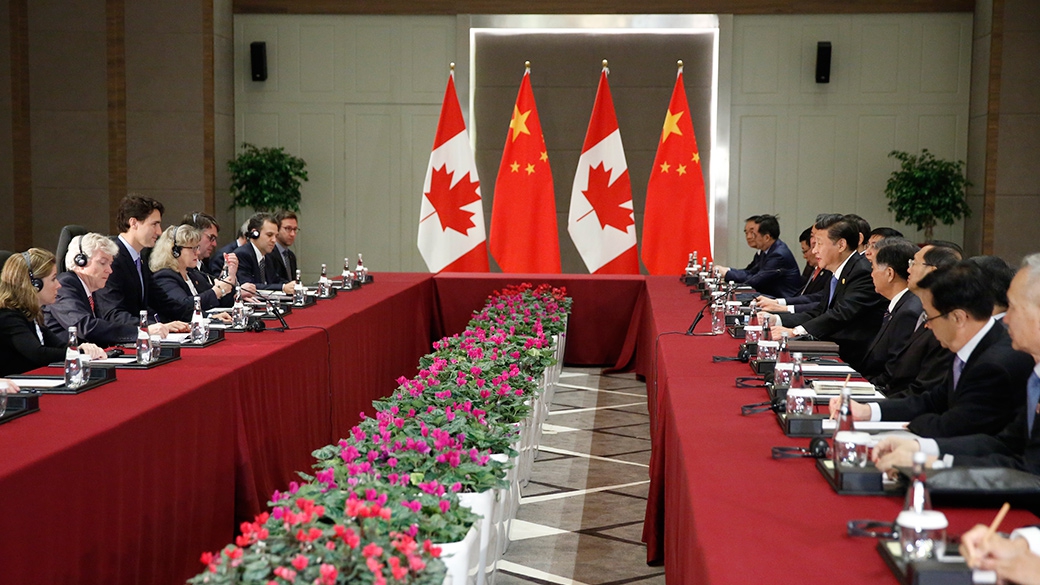Justin Trudeau set to head to China in December to open free trade talks
National Post | 18 November 2017
Justin Trudeau set to head to China in December to open free trade talks
by John Ivison
Justin Trudeau is expected to announce he is heading to Beijing early next month to launch free trade talks with China.
The trip has not been finalized but diplomatic sources suggest he will head east in the first week of December.
The Prime Minister has just returned from Asia, where he committed Canada to the “core principles” of the Trans-Pacific Partnership, a trade agreement between 11 countries including Japan, Australia and New Zealand.
But Canada remains reluctant to sign on to a final TPP agreement, specifically over concerns that weaker rules of origin on auto components than those in force under the North American Free Trade Agreement would complicate the ongoing NAFTA renegotiation with the United States and Mexico.
The main prize of a TPP agreement would be preferential access to the Japanese market for Canada’s resource and agri-food industries. But Trudeau is wary of undermining the NAFTA talks for limited gains under TPP.
China is a different story. The belief that Canadian exporters need to have preferential access to growing Asian markets like China is considered worth the risk that launching negotiations may upset the Trump administration.
There is a growing belief in the Trudeau government that Trump’s attempts to blow up NAFTA will end up in a stalemate with Congress, ensuring that the status quo prevails. If that proves to be the case, launching talks with China would be worth the gamble.
Formal exploratory talks wrapped up in July and the Chinese are keen to open negotiations, in line with President Xi Jinping’s promotion of globalization and open markets.
Trudeau has had warm relations with Xi’s government since coming to power, in some measure because the Trudeau name has carried weight in Beijing since the current Prime Minister’s father opened diplomatic relations with the People’s Republic in 1970.
Opposition parties have been critical of the Liberal government for allowing Chinese companies to acquire potentially sensitive technologies, as with the recent takeover of B.C. firm Norsat.
Suspicions about Chinese motives, amid reports of widespread industrial spying, and concerns about lack of reciprocal investment opportunities dissuaded Stephen Harper’s Conservative government from pursuing free trade talks in 2012.
Public opinion remains split on the issue and Conservative leader Andrew Scheer has made clear he opposes opening talks.
Polls suggest Canadians are concerned about China’s military assertiveness and the threat to Canadian jobs under a trade deal with lax labour and environmental standards.
Trudeau pushed for his “progressive” trade agenda to be included in the TPP text. But there will clearly be challenges writing gender, labour and environmental standards into an agreement with communist China.
At the same time, many Canadians are pragmatic about rising economic opportunities.
A study last year by the Canada China Business Council Offered conservative estimates that under a trade deal, exports to China — currently around $20 billion — would grow 50 per cent. Jobs would be created in the automotive, chemical and seafood industries, with further opportunities in agriculture, clean technology, natural resources and aerospace.
It’s clear that bright prospects exist for Canada to do business with a country that can’t feed itself.
But there remain concerns about the continued threat from state-owned enterprises, the prospect of floods of cheap labour and violation of intellectual property laws. Steel producers, textile manufacturers and automotive unions will oppose the prospect of any deal.
Other stakeholders are likely to wait and see the exact nature of the deal that emerges.
Still, in theory — and in this case, the theory is that of comparative advantage — the prize of preferred access to the Chinese market, is one worth pursuing.






